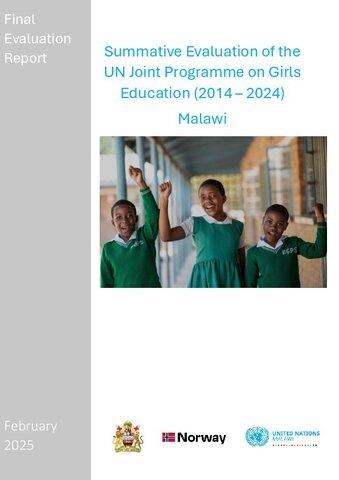
The UN Joint Programme on Girls’ Education (JPGE), implemented from 2014 to 2024 in Malawi, represents a collaborative effort between the Government of Malawi and three United Nations agencies: UNICEF, UNFPA, and WFP. The programme was designed to address systemic barriers hindering girls' access to and completion of quality education, in alignment with Malawi’s national development priorities and global commitments, including the Sustainable Development Goals (SDG 4 – Quality Education).
This UNICEF-led evaluation carried out in 2024 covered all three programme phases (2014-2024) across the four participating districts: Mangochi, Dedza, Salima, and Kasungu. The evaluation assessed the programme’s relevance, coherence, efficiency, effectiveness, impact, and sustainability. The aimed to support both accountability and learning purposes by: 1) assessing long-term impact; 3) identifying best practices, achievements and challenges, 4) informing decision-making, and 5) ensuring accountability and transparency.
Key evaluation findings included:
- The JPGE demonstrated a strong alignment with national policies, government priorities, and international frameworks. Its targeting of out-of-school adolescent girls and learners with disabilities enhanced inclusivity, though poverty remained a significant barrier. The programme demonstrated adaptability by integrating COVID-19 response measures, including take-home rations, cash transfers, and remote learning initiatives.
- Strong multi-sectoral collaboration of government ministries at the district level ensured a coordinated approach, with clear role delineation among WFP (nutrition), UNICEF (education), and UNFPA (sexual and reproductive health and rights) enhancing internal coherence. However, inter-agency communication gaps and delays in implementation sometimes affected programme alignment. Weak functionality of the Steering and Joint Technical Committees at the national level limited strategic oversight.
- While school feeding programmes were consistently delivered, other interventions faced delays due to logistical constraints, late funding disbursements, and infrastructure challenges, particularly in rural areas. Resources were allocated strategically, but disruptions in fund flow often required adjustments to programme activities, reducing overall efficiency.
- The JPGE programme enhanced teacher capacity, improved gender-responsive learning environments, and increased school attendance, with school feeding improving dietary diversity for learners. Safe spaces helped out-of-school girls reintegrate, and youth-friendly clinics expanded access to SRHR services. However, higher education outcomes remained limited, and male engagement in gender equality efforts, though promising, lacked consistency to sustain transformative change.
- The JPGE had no significant impact on higher-level educational outcomes due to multiple external shocks (COVID-19, floods, droughts), increased enrolment straining school resources, and pre-existing gaps in infrastructure and learning materials. However, there were noted improvements in some key indicators such as drop-out among girls.
- The programme fostered strong community ownership, with traditional leaders, Mother Groups, and Village Education Committees enforcing by-laws to reduce early marriage and pregnancy. High teacher retention (70%) supports long-term continuity of gender-responsive pedagogy. However, limited government funding threatens scale-up, though UN agencies are securing alternative funding to continue select interventions.
Key recommendations from the evaluation included:
- Establish a Programme Management Unit with agency staff reporting to a JPGE Coordinator to improve coherent implementation and M&E.
- Enhance the involvement of the Resident Coordinator’s Office in national technical coordination to improve oversight and support for the joint programme approach. Ensure strong agency and government commitment to maintain functional coordination structures.
- Strengthen strategic collaborations with organizations addressing poverty, livelihoods, disability support, and school infrastructure to enhance the programme’s impact on higher-level education outcomes.
- Expand community-led interventions by scaling up proven models such as safe spaces, Mother Groups, and traditional leader engagement to sustain and strengthen gains in girls' education and SRHR.
- Support the Ministry of Education in advocating for sustained financial commitment from the treasury for the Home-Grown School Feeding Programme.
- Integrate mobile clinics with complementary Interventions to maximize impact. Ensure future investments address stigma through youth-friendly social mobilization and enhance access to SRH/HIV services for young people.
- Future programmes should increase investments in teacher training, inclusive infrastructure, and assistive learning resources to better support learners with disabilities.
| Document | File |
|---|---|
| Terms of reference |
PDF | 789.61 KB
Download
|
